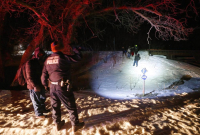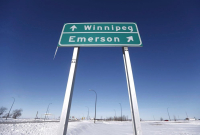Support strong Canadian climate journalism for 2025
Montreal's iconic Olympic Stadium will be the first place some newcomers to Canada call home, with the venue starting to be used as a shelter for asylum seekers.
The first groups were bused to the stadium on Wednesday as Quebec continues to manage a recent influx of people entering the province from the United States.
Volunteers from the Quebec Red Cross helped set up the cavernous facility for a temporary stay with cots and food in the rotunda.
According to recent federal government data, preliminary figures for June suggested a "pronounced shift" in the number of people arriving in Canada at the Quebec-U.S. border.
Francine Dupuis, who oversees a Quebec government-funded program that helps seekers get on their feet, told Radio-Canada the numbers are not what they're used to handling.
Dupuis said the stadium is just one of several sites it has considered, although "it's certain we won't be there long term."

Richard Goldman of the Committee to Aid Refugees said it is too early to say if the spike in the number of asylum seekkers will be sustained, but acknowledged that all services are feeling the crunch.
"Definitely, everything is overloaded and that's why the Olympic Stadium is being put into service," said Goldman. "There's a great demand for all services."
Part of the problem is that many of those entering in Quebec have no intention of staying here and end up leaving for other cities, notably Toronto.
Goldman estimates that one-half of the people entering Quebec have plans to move elsewhere.
"In other words, this overload problem is due to the fact people are here temporarily and are planning to leave," he said.
The influx has meant that admissibility hearings, where seekers at the border were getting initial vetting and a hearing date in the city of their choice, are no longer completed in 72 hours as was once the case.
Instead, those people are sent to Montreal to have an appointment that could come one or two months later, Goldman said.
Many of those arriving Wednesday appeared to be of Haitian descent.
In the United States, the Trump administration is weighing ending a program that granted Haitians a so-called "temporary protected status" following the massive earthquake that struck in 2010.
If the program isn't extended, as many as 60,000 Haitians could be sent back to their homeland.
Goldman said he has no idea if the fear is founded, but it appears to be a deciding factor for those choosing to flee.
Montreal Mayor Denis Coderre, an outspoken critic of the U.S. administration's immigration policies, went on Twitter to welcome Haitian arrivals and tell them they can count on the city.
"The city of Montreal welcomes Haitian refugees," he tweeted. "You can count entirely on our collaboration... This is another consequence of the immigration policies of Donald Trump."
Coderre also wrote on Twitter that his own sources had told him that there had been 2,500 new asylum seekers who arrived in Quebec from the U.S. in July and that there were currently 500 at the Lacolle border crossing, south of Montreal.
Jean-Pierre Fortin, president of the union representing Canada Border Services Agency border guards, said 500 people crossed illegally on Tuesday alone as he and a CBSA manager visited Roxham Road in Hemmingford, a popular crossing for asylum seekers since last November.
"The numbers have exploded in the last week and a half," said Fortin. "My colleagues at the border said it was a similar day today (Wednesday)."
The agency doesn't have any short-term solutions, Fortin said. In the medium term, they're talking about building facilities to share with the RCMP, which handles the arrests.
Fortin is renewing a call made since last November for the federal government to allocate more resources to help exhausted border guards.
"It takes eight hours to actually conduct one file, so if you're multiplying that by 500, it gives you an overview of the amount of work it's generating for our officers right now," Fortin said.
Richard Goldman of the Committee to Aid Refugees said it is too early to say if the spike in the number of asylum seekers will be sustained, but acknowledged that all services are feeling the crunch.
"Definitely, everything is overloaded and that's why the Olympic Stadium is being put into service," said Goldman. "There's a great demand for all services."
Part of the problem is that many of those entering Quebec have no intention of staying here and end up leaving for other cities, notably Toronto.
Goldman estimates that one-half of the people entering Quebec have plans to move elsewhere.
"In other words, this overload problem is due to the fact people are here temporarily and are planning to leave," he said.
The influx has meant that admissibility hearings, where seekers at the border were getting initial vetting and a hearing date in the city of their choice, are no longer completed in 72 hours as was once the case.
Instead, those people are sent to Montreal for an appointment that could come one or two months later, Goldman said.
Goldman said there is a possible federal plan that would see migrants referred directly to the city of their choosing instead of waiting in Montreal.
Fortin confirmed the idea was raised by his employer this week, but added agents still have to do their due diligence.
"You need to make sure that these people at the beginning (are checked).... before you send them to different places in Canada," Fortin said.
Quebec Immigration Minister Kathleen Weil and Public Health Minister Lucie Charlebois will provide an update on the situation Thursday.
— with files from Peter Rakobowchuk in Montreal and National Observer





Comments